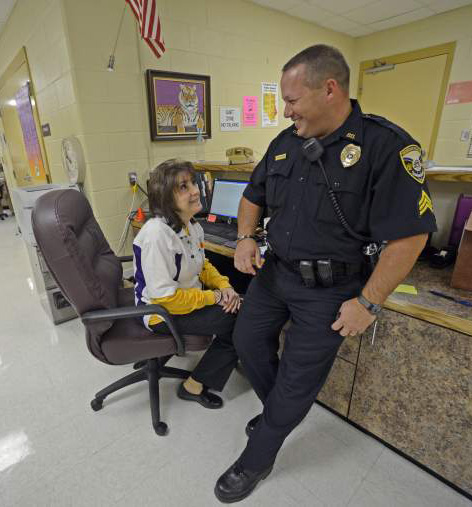School Resource Officers Navigating Information Sharing
 On a daily basis, School Resource Officers (SRO) are confronted by the question of whether they can legally share or obtain information with school staff about students they all serve. This question also applies to information sharing between these school-based law enforcement officers and professionals serving children outside the school, such as health care providers and social service caseworkers. Further confusion arises when students are involved in multiple systems, including juvenile justice, mental health, child welfare, and others.
On a daily basis, School Resource Officers (SRO) are confronted by the question of whether they can legally share or obtain information with school staff about students they all serve. This question also applies to information sharing between these school-based law enforcement officers and professionals serving children outside the school, such as health care providers and social service caseworkers. Further confusion arises when students are involved in multiple systems, including juvenile justice, mental health, child welfare, and others.
Unless information is shared, providers may only have a partial picture of what is going on between a student and his or her family. They will only know what the individual student or family member has shared and may not realize or know how to treat the root cause of a problem. If information is not shared, the SRO or provider could develop and implement plans that might have been deemed inadvisable had the complete picture been available. When information is shared, it must be done in compliance with federal and state privacy laws. As illustrated in the scenario presented later in this article, SROs and other personnel within the school often feel confused about sharing information, even when they seek to prevent harm and intervene in the best interests of the student.
The Navigating Information Sharing (NIS) Toolkit and website were created to help school-based law enforcement officers and all other service providers in a school-community partnership address the complexities of information sharing about young people in multiple systems. NIS aims to help these young people and their families by supporting school and community providers to more effectively develop and navigate information-sharing systems, policies, and procedures. NIS was developed by the National Center for Mental Health Promotion and Youth Violence Prevention at Education Development Center, Inc. (EDC), with funding from the U.S. Substance Abuse and Mental Health Services Administration (SAMHSA).
NIS Summit
On January 11, 2013, EDC convened the NIS Summit—a meeting of experts from the fields of education, mental health, law enforcement, juvenile justice, and child welfare—to discuss challenges and solutions related to sharing information about children and youth involved in multiple systems. The Office of Community Oriented Policing Services (COPS Office) was represented by John Markovic, Senior Social Science Analyst. The NIS Summit participants worked to advance solutions to support schools and community agencies to more effectively develop and implement information-sharing systems, policies, and procedures.
Use of real-life scenarios
One of the major contributions of NIS is the use of scenarios that illustrate common information-sharing challenges. When confronted with a situation in which it would be helpfulóor is requiredóto share or obtain certain protected information about a student, NIS suggests that local partnerships consider the following questions:
- Who [what agency] has the information?
- Who [what agency] wants the information?
- What specific information does the requester want?
- What exactly does the requester want to do with the information?
- What laws are relevant to this situation?
- What do these laws permit, and what do they prohibit?
- How can school personnel proceed legally to get the student help?
Illustrative Scenario
Here is one of the scenarios from NIS:
School Resource Officer and school counselor discussing information about studentís attendance, grades, and home address:
 An SRO employed by the school police department at the local high school is concerned about a student. He has observed the student hanging out with known gang members and has seen him out after curfew a number of times. He asks the school counselor if she can share with him the studentís attendance records and grades. Heíd also like the studentís home address and phone number, as he plans to go to the studentís home and ask the mother to work with him to help the student stay out of trouble. The school counselor says, “I canít give you that information—itís protected under FERPA.1”
An SRO employed by the school police department at the local high school is concerned about a student. He has observed the student hanging out with known gang members and has seen him out after curfew a number of times. He asks the school counselor if she can share with him the studentís attendance records and grades. Heíd also like the studentís home address and phone number, as he plans to go to the studentís home and ask the mother to work with him to help the student stay out of trouble. The school counselor says, “I canít give you that information—itís protected under FERPA.1”
Who has the information?
The high school counselor.
Who wants the information?
The SRO.
What specific information does the requester want?
The SRO asks for the studentís home address and phone number, attendance records, and grades.
What exactly does the requester want to do with the information?
The SRO intends to go to the studentís home and ask the mother to work with him to develop a plan to keep the student from getting into trouble.
What laws are relevant to this situation?
The school counselorís disclosure of information to the SRO is governed by FERPA.
What do these laws permit, and what do they prohibit?
A studentís home address and phone number are considered “directory information” under FERPA. According to the U.S. Department of Education, directory information includes, but is not limited to, the following data about a student:
- Name
- Address and telephone
- Date and place of birth
- Major field of study
- Activities
- Dates of enrollment
A studentís attendance record and grades, by contrast, are not directory information. Under FERPA, the school counselor would need the parentís signed authorization to release the studentís grades and attendance records to the SRO. However, there are some exceptions to the parental authorization requirement that may be used in this situation if certain requirements are met:
- FERPA allows disclosure without parental consent to other school officials who have a legitimate educational interest in the records. The school must include in its annual notification to parents the specific criteria for determining who is a school official and what constitutes a legitimate educational interest. In this scenario, the counselor may provide the requested information to the SRO if the schoolís notification specifies that the SRO is a school official with a legitimate educational interest. (If the school is permitted to release information to the SRO under this exception, the SRO may not re-disclose the information to a third party without the parentís consent.) If the school does not meet these requirements, the school counselor can only disclose information to the SRO if the counselor has the parentís signed authorization.
- Alternatively, the school counselor can disclose information to the SRO if served with a subpoena or court order to do so. But if the school receives such a subpoena, it must make a “reasonable effort” to notify the parent of the order or subpoena before releasing the records to law enforcement.
How can school personnel proceed legally to get the student help?
School personnel can ask the parent to come in to discuss the situation with the SRO and the counselor and then to sign a consent form to allow the counselor to give the SRO the desired information. The authorization can and should contain assurances that the information will be used only to assist the student and that no further disclosure will be made.
 Seeking new scenarios
Seeking new scenarios
To further augment the NIS project, EDC is seeking new scenarios to add to the NIS website. The plan is to feature new scenarios, then answer the essential questions with the assistance of a number of experts in the field, giving the reader “best practices” upon which to make their decisions. This information will be presented with the disclaimer that it is not intended to replace legal advice. Ideally, the scenarios are one or two paragraphs long and contain a description of the type of information that someone is requesting or is being asked to share, the roles of the professionals involved, and a brief summary of why one or more individuals in the scenario are reluctant to share the information. In particular, we are looking for new scenarios on the following topic: Challenging situations involving the juvenile justice system.
If you have a scenario to contribute, please send it to NIS@edc.org,
John Rosiak and Emily Veysey
Education Development Center
1FERPA refers to Family Educational Rights and Privacy Act (FERPA) (20 U.S.C. ß 1232g; 34 CFR Part 99), a federal law that protects the privacy of student education records. The law applies to all schools that receive funds under an applicable program of the U.S. Department of Education. More details are available from the NIS Toolkit.
American Policing in 2022 Goes to Yale | SROs and Information Sharing | Preparing officers for a community oriented department | What we can do about street harassment | 2013 Sutin Civic Imagination Award | Medal of Valor and Badge of Bravery

